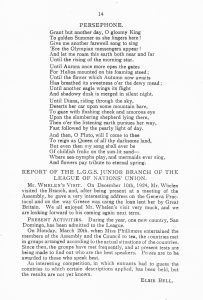
Report of LGGS Junior Branch of LNU, LGGS Chronicle, 1925
Courtesy of Lancaster Girls’ Grammar School
Following a lecture by Mr Whelen of the League of Nations Union (LNU), students at Lancaster Girls’ Grammar School set up a junior branch/club of the LNU in April 1923. All students over the age of 12 were allocated a country and a representative from each country attended the Assembly, which met at least once a year. Pupils attended an annual lecture, which covered topical League issues such as the Geneva Protocol, Freedom of the Seas, Palestine, Maritime Supremacy, disarmament, Franco-German relations, Spain in 1937 and the political biographies of leaders such as Hitler and Roosevelt. The Assemblies held discussions and reported on topical issues. They sang the League of Nations Song.
By 1934, interest in the Club was waning and the school magazine reported that the Club officials struggled to find speakers for the Assembly held at the end of the autumn term. The proposal for debate was ‘That the Peace Ballot is of use in promoting World Peace,’ but few responded and when the vote was taken, ‘to our horror, the proposition was defeated.’ The article added ‘We can only hope that since that day the School has perhaps found out a little about the facts, of which, sad to relate, many of us knew practically nothing, as was manifest by the result of the debate.’ Despite attempts to revitalise the Club, and continued annual LNU lectures, it was replaced in 1938 by the International Circle, which aimed to encourage more students to take an interest in world affairs.
References/Further Reading:
LGGS Chronicle, 1923-38, Lancaster Girls’ Grammar School Archive.

